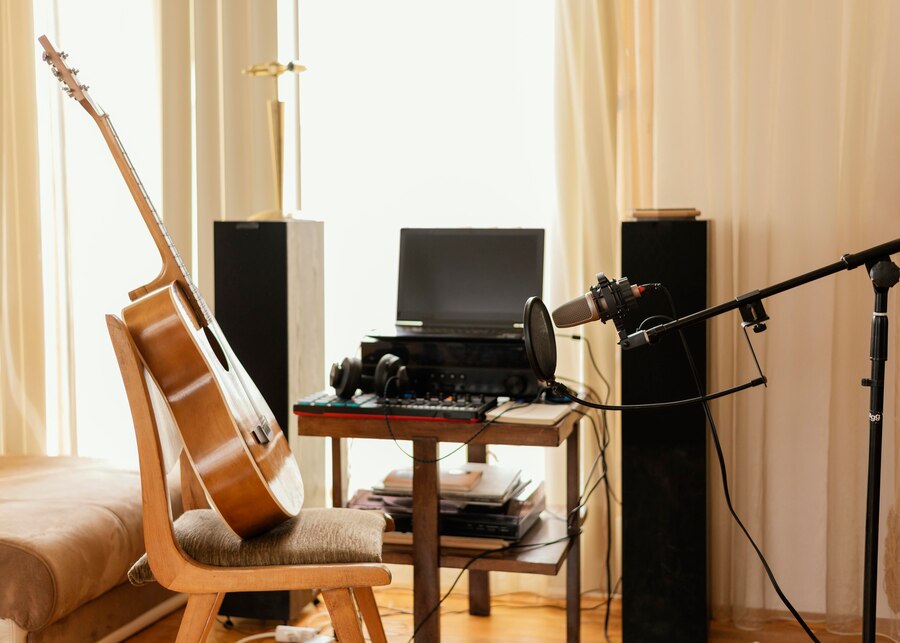Home studios have revolutionized the music production industry, allowing artists to create exceptional quality sound without the hefty expense of professional recording studios. So, let’s jump into some mastering tips for home studios that will significantly ameliorate your home recordings.
1. Understanding the Fundamentals of Home Studio Mastering
Key Requirements for Home Studio Mastering
The fundamental novelties in home studios are the building blocks of music production. Key components such as the studio room, the recording equipment setup, and the acoustics play integral roles in determining the quality of the sound produced. It’s quintessential to understand home studio acoustics, laying the framework for your home recording studio along with mastering in a small space. Firm comprehension of these elements provides a concrete foundation for delivering high-definition audio quality, leading to the application of ultimate home recording techniques.
2. Setting Your Mastering Goals
Destination and Standards
In music production, having a clear concept of the result desired is fundamental. Setting your mastering goals incorporates a comprehensive understanding of the sound you intend to achieve. What distinguishes professional mixes is their standards and the consistency of quality. Aim for these standards, employing studio sound optimization to match your desired outcome.
3. Equipment Needed for a Home Studio Preparation
Importance of Loudness Meters and Spectrum Analyzers
When setting up a recording studio, particular pieces of equipment are indispensable. The essence and use of loudness meters and spectrum analyzers are distinct, providing a more precise perceptions of your sound. These tools assist in maintaining consistent audio levels, an essential aspect of audio mixing mastery and paramount for accurate mixing levels.
4. Introduction to the Basic Tools for Mastering
Steps of Mastering at Home
The mastering process can seem overwhelming for beginners, but once you grasp the basic tools and steps, it quickly becomes second nature. Implementing the mixing and mastering basics together with DIY recording tips boost your efficiencies at the mastering stage, creating quality sound while preserving the music’s essence.
5. Exploring Compression and EQ Movements
Setting the Right Level With Limiting and Equalization
Compression and equalization are two of the most vital processes in audio production. Learning about these, combined with affordable studio gear, are key for grasping how to effectively manipulate sound. The right level of limiting and equalization significantly impacts the final playbacks, creating a cohesive, balanced mix.
6. Achieving Consistency in your Audio Levels
Level Matching Techniques
Confidence in your mastering comes from understanding audio levels and how to achieve consistency. Level matching techniques maintain uniformity in your sound waves, an essential element in producing professional-grade sound while maintaining the mix integrity.
7. Maintaining Mix Integrity
Translating Mix Changes and Monitoring Consistently
Maintaining the integrity of your mix is about careful and deliberate changes, and monitoring consistently. Your home studio set-up will need to include the necessary tools to make sure you’re capturing all the nuances of the sound mixing process.
8. Steps to Improve your Mastering Process
Rinse, Repeat, and Refine
Improving your mastering process involves an iterative approach. Continually refining your mix, possibly with the help of mastering software reviews, will eventually yield a polished, high-quality sound.

9. Building Confidence and Consistency in your Mastering
Tips for Gaining Proficiency in Mastering
Building confidence and achieving consistency comes with practice and continuing education. Expanding your knowledge base on home studio mastering, and investing in mastering for beginners resources, can greatly increase your proficiency and understanding.
10. Expanding your Knowledge on Home Studio Mastering
Continuous Learning for Mastering Enthusiasts
Keep learning. The field of audio production is constantly evolving, so expanding your knowledge base through continuing education is an essential part of being an avid mastering enthusiast.
This comprehensive guide to mastering in home studios is meant to help you understand and enjoy the process of music production from the comfort of your home. Remember, practice makes perfect. Be patient with the process, invest in learning, and continually refine your technique to create high-quality sound.

